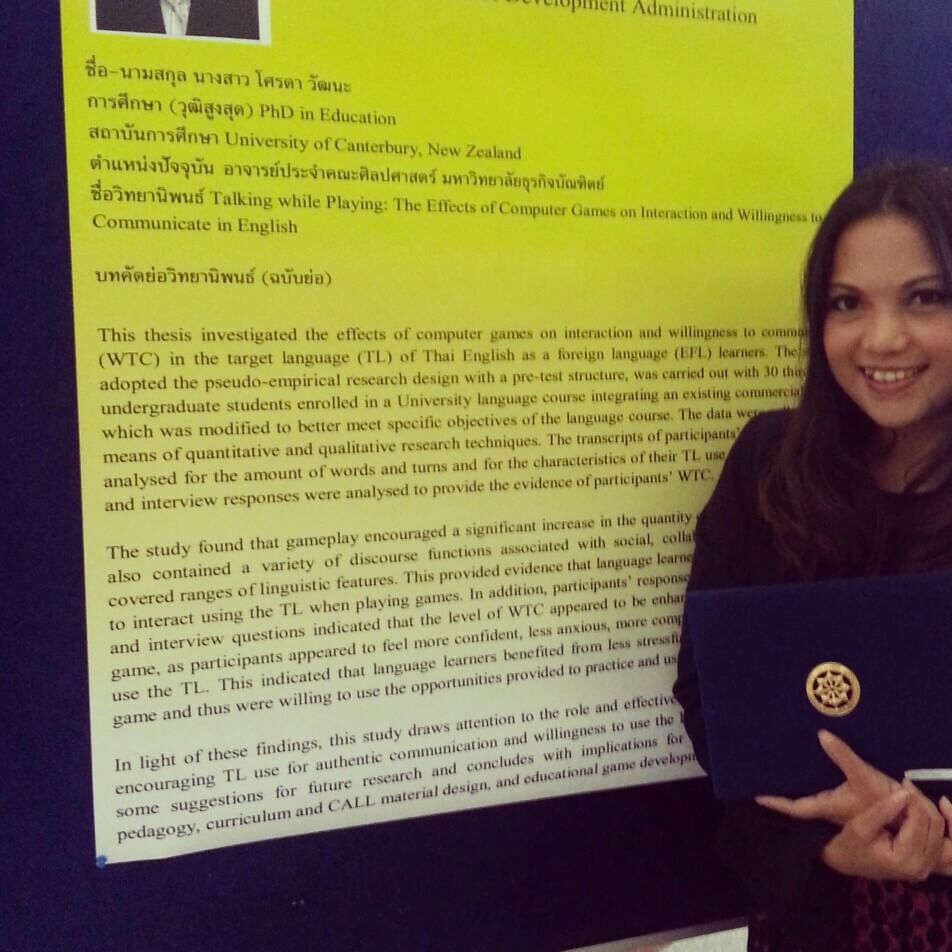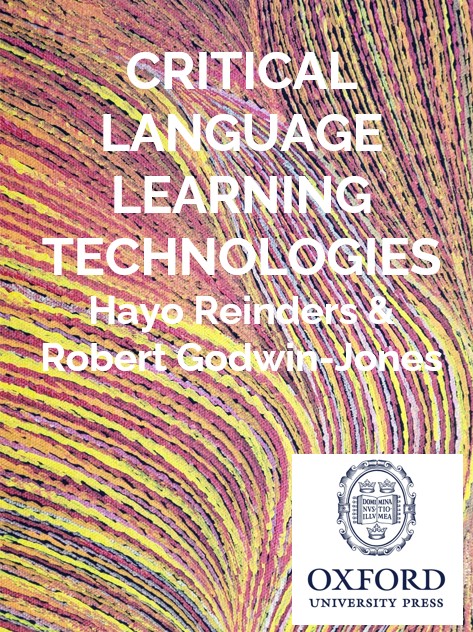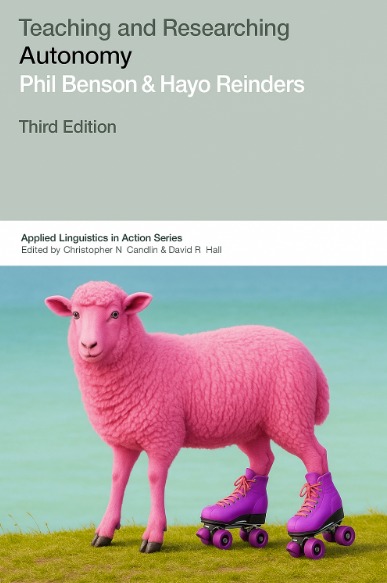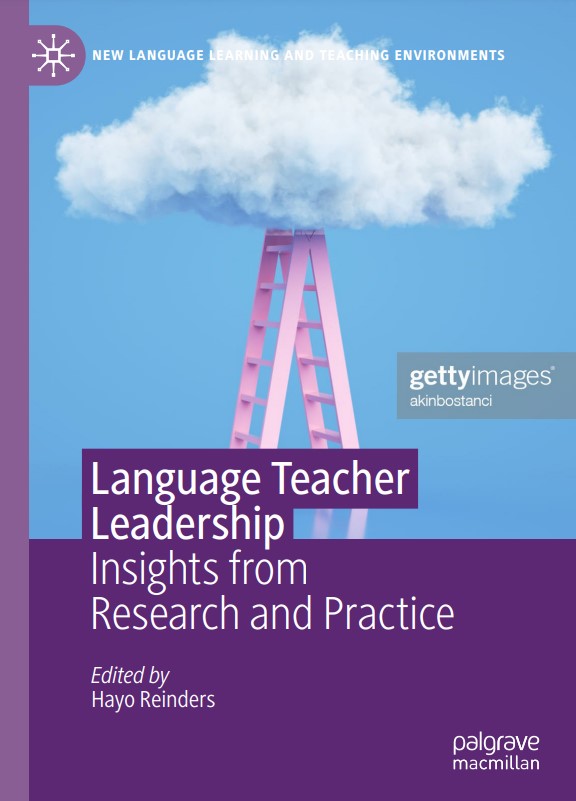Hire me > Research and Supervision
I enjoy collaborating with MA and PhD students and staff in order to help develop research projects. My specific areas of interest include:
- The role of technology in learning and teaching
- Learner autonomy and self-access
- Out-of-class learning
- Innovation and Leadership in language education
- The psychology of the language learner
- Language processing (attention and noticing)
- Mobile learning
I currently supervise eight doctoral candidates, who are investigating a wide range of topics. You can read their abstracts below. They include the (mis)match between teachers' perceptions of learners' difficulties and learners' perceptions of their own difficulties, the role of timing in focus-on-form, the use of DIY corpus building for independent learning, the role of computer games in EFL, classroom practices for teacher autonomy, and out-of-class learning. I sometimes take on new students, depending on my workload, the degree of overlap between the student's research and my own, and the level of the student's previous work. I supervise by using a wide range of online tools. I have limited time and can only take on students who meet a number of requirements, and whose research interests overlap with my own, and only with the permission of my institution. Feel free to contact me for more information.
Here is a reference from a former student, Junaiday Bte Januin, from Malaysia:
I found working with Hayo not only enjoyable but also very fruitful and academically stimulating. As an advocate of 'Learner Autonomy', he really puts what he's been writing into practice; he has coached me to be an autonomous learner myself to realise the fruits of learner autonomy. Hayo has always been generous with his knowledge and expertise; he has meticulously guided and facilitated me in preparing a sound PhD proposal. In brief, working with Hayo is an invaluable experience.
And here another one from a Thai student, Sorada, studying in New Zealand:
Thank you again for everything you have done for my proposal. Although we have talked to each other only for about 3 months, I feel that it is almost 3 years since I have learned a lot from you. Thank you for being supportive and always available when needed.
Sorada recently won the prize for best PhD thesis in Thailand – huge congrats!

"The cure for boredom is curiosity. There is no cure for curiosity." – Dorothy Parker.
Below you can read about my students' research.

Nadia Hoover
Perceptions of and barriers to professional development of K-12 teachers
Doctoral student, Anaheim University, USA
Abstract
Continuous development for in-service teachers is crucial for enhancing teaching effectiveness and student learning. The overwhelming demands in education underscore the urgent need to develop teaching capacity to better support students, especially English learners. In California, while every in-service teacher is required to have authorization to teach English learners, this requirement alone is insufficient for teachers to feel adequately skilled in addressing the specific needs of these students. A significant factor influencing teachers' professional growth is their lack of participation in optional professional development (PD) opportunities. It is essential for teachers to voice their needs and disclose the barriers hindering their engagement in PD opportunities. Without revealing these factors, district and school leaders cannot gain the clarity needed to address these issues effectively.
This study was designed to explore the current reality of in-service teachers in California. The primary aim was to explore the insights in-service K-12 general education teachers on professional development in support of students and including English learners. The study focused on the seven features of effective professional development identified by Darling-Hammond et al. (2017) and the barriers that hinder participation in PD opportunities. A mixed methods two-phase design was employed for this research, utilizing a questionnaire followed by an interview as data collection instruments. The first phase involved a questionnaire that gathered quantitative and demographic data, while the semi-structured interview in the second phase collected qualitative data on teachers' insights about optional PD opportunities and the barriers preventing their participation.
The findings highlighted that increasing motivation to engage in PD sessions depends on the presence of effective PD features, encouragement from colleagues and administrators, and the reduction of barriers. Allowing in-service teachers to share their perceptions and participate in the planning of PD opportunities could enhance their motivation to engage in these sessions. As a result, teachers' learning would improve, contributing to the strengthening of PD delivery quality and effectiveness, thereby positively impacting instruction in the general education classrooms.
Comments: Working with Hayo over the past few years has been an incredible experience. I took several courses focused on teacher development, course design, and instructional strategies, and it quickly became clear that his expertise was a perfect match for my areas of interest. As a supervisor, Hayo was a tremendous source of support, always available to answer questions and provide thoughtful guidance. His insights challenged me to broaden my thinking and explore new perspectives. I highly recommend Hayo as a supervisor, as he is committed to sharing his knowledge and empowering others to grow.

Azusa Yamamoto
Japanese university students' engagement in extensive listening beyond the classroom and teacher practices
Doctoral student, Anaheim University, USA
Abstract
Language learning beyond the classroom (LBC) has been recognized as a major contributor to language acquisition, especially in EFL contexts. As a result, extensive listening beyond the classroom (ELBC) holds significant importance. As technology advances, the role of digital media in informal language learning has captured the interest of researchers. However, there is limited understanding of how and why Japanese university students participate in ELBC, as well as the factors influencing teachers' support or lack thereof for this practice.
This study investigates the extent and manner in which Japanese university students engage in ELBC, as well as their motivations for doing so. Additionally, it explores how much university English teachers promote and support this practice, along with their reasons. The study administered a questionnaire to 167 students and 40 teachers, and carried out semi-structured interviews with 10 students and seven teachers. The quantitative data were analyzed using descriptive statistics, and the qualitative data underwent thematic analysis to identify recurring patterns and themes, based on the self-regulated learning (SRL) models proposed by Zimmerman (2000) and Reinders et al. (2023).
The findings indicated that over 65% of students engaged in ELBC, primarily through songs, videos, and movies, though often briefly and passively prioritizing content interest over comprehensibility. Furthermore, it was found that more self-regulated learners engaged in more active forms of ELBC compared with less self-regulated learners, who engaged in ELBC more incidentally and passively. Self-motivation and environmental factors also significantly influenced their engagement or lack thereof. Teachers held positive views on ELBC, but their classroom support was limited due to multilayered beliefs, limited knowledge of ELBC and an emphasis on intensive listening practices.
These results imply that in order for students to effectively engage in ELBC, teachers should provide explicit instruction and guidance on ELBC and SRL strategies. To achieve this, faculty development and institutional support are essential in a broader educational context. The study contributes to understanding the current state of self-directed ELBC in Japanese university context.

Joseph Klipp
The effect of different types of computer-assisted corrective feedback on L2 learners' pragmatic learning performance
Doctoral student, Anaheim University, working in Japan
Abstract
Corrective feedback (CF) positively effects second language acquisition (Li, 2010). However, little is actually known about its role in the development of L2 pragmatics. In fact, most of the findings so far are limited (Bardovi-Harlig, 2017) and inconclusive (Sydorenko et al., 2020). Additionally, research of corrective feedback in computer mode is underexplored (Li, 2010). This is in spite the fact that a number of meta-analyses (e.g., Kang & Han, 2015; Mohamed, 2020) have shown that CALL feedback has a "significant, moderate, and positive impact on language learning" (Mohamed, idem, p.14-15). This study aimed to fill these gaps by investigating the impact of different types of computer-assisted CF on L2 learners' pragmatics learning. This study went a step further by adding an affective component to one of the CF treatments in order to determine whether it could enhance its effectiveness.
The affective component was investigated for two reasons. Firstly, because affective feedback has been traditionally seen as one of the least effective types of feedback for learning (Hattie & Timperley, 2007). Secondly, there has recently been a surge in research (Gonzalez-Lloret, 2018; Taguchi & Sykes, 2013) that has investigated its potential to help learners expand their cognitive resources and reduce their cognitive load, in particular in virtual environments (VEs).
By drawing on various theories such as the Cognitive Affective Model of Immersive Learning (CAMIL), the Cognitive Theory of Multimedia Learning (CTML), the Theory of Affective Pragmatics (TAP) and Sociocultural Theory (SCT), VE affordances including contextualization, immersion, social agency, social presence and ZPD were identified and drawn upon to create an optimized form of computer-assisted affective feedback. Unique features of the affective feedback included the usage of a video-based pedagogical agent (PA), a human character that emotionally reacted to the participant's language choices and gave hints, and the providing of scenario background information to make the PA's emotional reactions more salient and understandable.
In order to test the affective feedback, a pre-post test empirical study was conducted that included three PowerPoint treatment groups: an affective corrective feedback group with PA videos only (n = 28), high-information feedback group which included a traditionally well-established form of successful feedback (Wisniewski et al., 2020) with text only (n = 27), and a group with a combination of both affective and high-information feedback with PA videos and text (n = 27). All of the 82 participants in this study, Japanese high school 1st and 2nd year students attending one of two private Japanese private high schools in the suburbs of Tokyo (3 males and 79 females), were randomly assigned to one of the groups. Their English proficiency ranged from beginner (CEFR A1) to intermediate level of English (CEFR B1).
From the pre-post testing data results, statistical significance testing and effect sizes were calculated to determine whether there were gains in learning performance and to what extent. It was found that the optimized affective feedback treatment group not only made statistically significant gains (at the p = .1 level) in learning performance but also outperformed the other two feedback treatments. This study's results lend support to Moreno's (2010) argument that motivation, which can be positively affected by a PA's presence (Lang, 2022), can aid learning performance.

Kei Miyazaki
A needs analysis of Japanese secondary school EFL teachers' assessment literacy
Doctoral student, Anaheim University, USA
Abstract
This study investigated the Language Assessment Literacy (LAL) needs of Japanese secondary school teachers of English as a Foreign Language (EFL). Previous reviews of the literature have identified a general lack of awareness of LAL among Japanese EFL teachers, as well as contextual constraints within the Japanese educational system that influence their assessment practices. However, these studies lack specific insights into the particular contextual factors that affect teachers' LAL practices, as well as descriptions of their ongoing needs for professional development. To address this gap, this study adopted an ecological approach and drew on Activity Theory (Engeström, 1987) to carry out a comprehensive needs analysis.
Data were collected through questionnaires and semi-structured interviews with ten key stakeholders, including teachers, department heads, Educational Board members, and researchers. The analysis revealed six key themes. The first three themes – (1) limited school support, (2) challenges in implementing formative assessment due to high-stakes examinations, and (3) lack of assessment knowledge – corroborated the findings from the literature. However, the latter three themes – (4) divergent assessment approaches according to school type, (5) contrasting assessment practices between experienced and novice teachers, and (6) administrative hesitancy to enforce unified guidelines due to teachers' workloads – elaborated in detail for themes (1), (2), and (3), unearthing previously unexamined contextual factors.
Applying Activity Theory, this study identifies specific gaps in teachers' LAL related to limited several aspects of Engeström's model, including access to "mediating artifacts," a lack of "community" and "division of labor" in assessment practices, and conflicting "rules" influenced by both external pressures and internal school customs. The findings highlight contradictory forces with regard to LAL support, in which Educational Board members perceive sufficient provision, whereas teachers and department heads report a lack of practical guidance.
Based on its findings, this study proposes key areas for future LAL training, including practical workshops, professional development for administrators, advocacy for policy changes supporting alternative assessments, and the integration of technology for efficient assessment practices. As a result, it is hoped this study can contribute to improving the quality of their language assessment practices in Japanese educational context.

Nathan Calvert
Future Ready: Developing a collective understanding of a school tagline
Master's student at Unitec, Auckland; Working in New Zealand
Abstract
Kristin School's tagline, 'Future Ready', is used to promote the school. As the meaning of Future Ready (FR) hasn't been explored, staff members currently have differing understandings of what FR means in theory and in practice. The aim of my action research project is to develop a collective understanding of the FR tagline amongst Kristin School staff. This will be carried out through a series of professional learning workshops involving a group of staff members. Researchers report that the world will experience major change in the next 20 years, driven by megatrends such as automation, artificial intelligence and exponential growth in computing power. Coupled with environmental challenges such as climate change, researchers report that the future world will be more volatile and uncertain than it currently is. As a result, the education sector needs to realign its focus to help prepare students to address these challenges. The workshops will introduce staff to research on future-focused education and futurist thought regarding predicted global changes that will occur over the next 20 years, and consider ways schools can prepare students to be ready for an unknown future. The workshop group will synthesise the research shared and use this to develop a common understanding of FR within a Kristin context. Changes in the workshop group's individual and collective conceptual understanding will be measured using interviews and concept maps. The impact of participation in the workshop group will be measured using interviews. The workshop group will consider ways in which the wider staff can also be involved in the development of a collective understanding of FR and how the FR tagline can be operationalised within the school.
Kelly Schroeder
Language Teaching at a Time of Crisis: Where do Teachers Turn?
Doctoral student at University Anaheim, USA
Abstract
Change is an everyday feature of teaching. Much research has been conducted on the nature of change in the context of innovation and planned, or policy changes and the impact change has on pedagogy. It remains unclear, however, where teachers turn to in times of unplanned change. Specifically, it is unclear what role (if any) second language acquisition (SLA) research and language teacher pedagogy (Loewen, 2009; Borg, 2015; Sato & Loewen, 2019) has in such situations. Many studies related to a research/pedagogy link indicate that there is a gap between the two; that SLA research does not have much relevancy for language classroom pedagogy. However, these studies relied on a contextual continuity of the environment, the tools, and the students' and teachers' lives. This study asks language teachers where they turn to make pedagogical decisions in times of change, specifically in a time of crisis. Do teachers carry on with their usual methods of making pedagogical decisions? What role, if any, does research play in teachers' decision-making in times of crisis? To answer these questions, a survey was conducted that asked teachers where they turned to for pedagogical decisions in times of crisis. To provide deeper insight into pedagogical decisions, interviews were conducted to illuminate the process by which teachers made their decisions in greater detail.

Henry Foster
Bootstrapping autonomy: A student-led action research project
Doctoral student at University Anaheim, USA
Abstract
In the field of language learning, learner autonomy has been a focus of research for some fifty years, and in particular there has been a proliferation of studies since the turn of the century (Benson, 2011). This increase in interest has included numerous studies in Japan (see, for example, Barfield & Nix, 2003; Mackenzie & McCafferty, 2002; Murphey & Jacobs, 2000; Nakata, 2009; Sakai & Takagi, 2009; Sakai et al., 2010; Smith, 2003; Tomita & Sano, 2016). However, the state of affairs in Japanese classrooms continues to present challenges and obstacles for language educators seeking to promote autonomy, including the backwash effects of Japan's university entrance exam system, institutional resistance to change, and cultural and motivational factors (Brown, 2017; Kikuchi, 2009; Ryan, 2009; Sakai & Takagi, 2009; Smith, 2020; Yamamura et al., 2003).
Adopting a mixed methods, action research/action case study design, the study explored ways in which learners themselves could contribute to the development of their own autonomy. The project was a collaborative student-led effort employing an intact class of 18 Japanese university students and held over a five week period as part of an elective course with a focus on educational issues. Data collected included a pre- and post-project questionnaire based on Sakai et al. (2010); observation notes; video recordings; individual written reflections collected post-project; and audio recordings of group discussions held post-project. The primary data analysis involved inductive qualitative coding, while the questionnaire was analyzed using descriptive statistics and paired-samples t-tests. During the project the students, choosing to work together as a class, negotiated and executed a plan of action. The narrative that emerged highlighted the importance of group dynamics to the process of collaborative autonomy development (Murphey & Jacobs, 2000), including the emergence of a leader figure, the formation of whole-group and sub-group identities, and peer modelling and scaffolding of autonomous behaviour. Student reactions to the project were largely positive, and there were indications that the project had positive effects in terms of promoting metacognition and learner motivation.
This study contributes to the understanding of the potential for learner autonomy development in the Japanese context, and provides an example of one approach to exploiting the group-orientedness of Japanese learners to promote a collaborative, interdependent movement towards autonomy.
Recent Graduates
- Robert Cavanaugh (USA) – doctoral dissertation 'Language Teachers' Self-Regulation of Pedagogical Sources of Stress'.
- Sachiko Nakamura (Japan) – doctoral dissertation 'The antidotes to boredom: a classroom-based study on strategy instruction to enhance boredom regulation for L2 learning'.
- Victor Stone (Canada) – Master's project 'Examining Turn Taking Between High-Intermediate Speakers of English in a Conversation Discourse'.
- Naoko Nakao (Japan) – Master's thesis 'This is the end! A case study of a Japanese learner's experience and regulation of anxiety'.
- Deborah Hay (New Zealand) – Master's thesis 'The practice of changing pedagogy: One teacher's experience in implementing portfolios'.
- Nathan Calvert (New Zealand) – Master's thesis 'Future Ready: Developing a collective understanding of a school tagline'.
- Kat Liu-Asumoa (New Zealand) – Master's thesis 'Disruptive Evolution: A Case Study of how One School Develops its Innovative Learning Environment'.
- Vatsana Vongsila (Laos) – Master's thesis 'Willingness to Communicate in an ESL classroom.'
- Jim Luders (New Zealand) – Master's thesis 'engagement of Maori students.'
- Lou Reddy (New Zealand) – Master's thesis 'Persuasion via Gamification: Mobile Applications for Supporting Positive Behaviour for Learning (PB4L) Pedagogy.'
- Winifred Chukwurah (New Zealand) - Master's thesis 'experiences, symptoms and management related to chronic fatigue syndrome: a small study.'
- Reshmin lata (New Zealand) - Master's thesis 'Enhancing professional Learning: Identifying obstacles and solutions to the successful development of pedagogical skills for teachers in an online distance school'.
- Tim Shawcross (New Zealand) – Master's thesis 'Online communities of practice in the secondary music classroom: A tool for increased collaboration and peer to peer learning?'
- Tina Swann (New Zealand) - Master's thesis 'Whakatipu iwi nui: Growing great people. An evaluation of Māra Kai and Service-Learning as a culturally responsive approach to teaching in an English-medium mainstream school in Aotearoa New Zealand'
- Monique Ngatoro (New Zealand) - Master's thesis 'the value of a school base digital learning framework: does it offer the support and guidance needed for teachers of varying digital capabilities?'
- Margo Thorpe (New Zealand) - Master's thesis 'key competencies leading teaching and learning - imagining new possibilities in education.'
Testimonial: "Hayo Reinders was the Principal Supervisor for my Masters thesis, which was completed in 2018. Hayo was an exceptional supervisor, whose timely feedback, guidance and questioning skills helped me immensely along my journey. Hayo regularly challenged my thinking which ensured that my thesis had a much greater depth than I'd anticipated. I highly recommend Hayo, and was grateful to have had the chance to complete my Thesis with his guidance." - Nathan Calvert, Auckland, New Zealand


